Two roads diverged in a yellow wood, And sorry I could not travel both, be one traveller, long I stood, And looked down one as far as I could, To where it bent in the undergrowth.”
In 1916, Robert Frost wrote the famous ‘Road Not Taken’. In it, he outlined the different paths one can take in one’s life. Whether Frost spoke of relationships or careers – is up for interpretation. However a career in humanitarian assistance is one path that few seem to tread.
One person who decided to choose this avenue was Eileen Morrow. The Dublin native works for Concern Worldwide, but since leaving college in the early 2000s she has worked for various NGOs in India, Haiti, Tanzania and Kenya.
Today, the 17 years of experience built up worldwide sees Eileen as country director of Nepal, a role that she says herself is as varied and rewarding as anyone could come across.
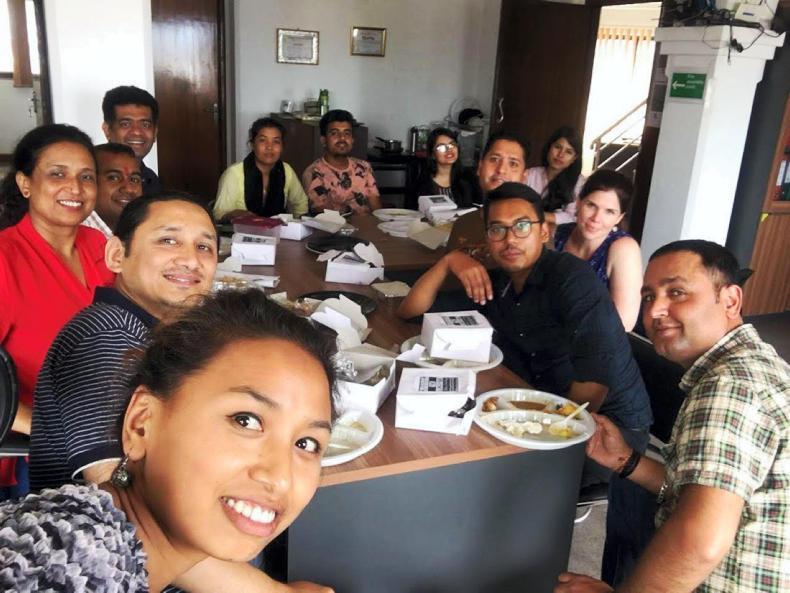
Eileen Morrow is the country director of Nepal, overseeing the humanitarian effort there.
“We spend 40 hours or more a week in work and I really believe in the value of finding what ignites your passion and pursuing it. What drew me to aid work was the urgent need to address poverty and injustice. What keeps me there is the huge learning opportunities and professional development, great colleagues and the chance to address complex problems and be part of something bigger,” she says.
In terms of career progression and variation, the humanitarian sector seems to tick the boxes thus far. But let’s backtrack for one minute.
Break
Eileen was born to Northern Irish parents in the Netherlands. Returning to Ireland at a young age, she grew up in Ballinteer in south Dublin before studying Psychology in UCD.
Travelling to India over college holidays in 2001, where she volunteered teaching English in a Tibetan Monastery, the then 20-year-old found the experience a real eye-opener.
“When I went to India for the summer I met so many people who lacked access to food, health care, education, water and clothes. I saw people doing back-breaking work, seven days a week and – even with that – couldn’t meet their basic needs.
“At the same time, people welcomed me into their homes, sharing what little they had with me, with such good humour and grace. It just didn’t seem fair that no matter what people tried, how hard they worked, they couldn’t escape the poverty trap. So I realised there was a big problem and I wanted to join the humanitarian effort.”
That she did. A Master’s degree in humanitarian assistance from the University of Groningen in the Netherlands led to an internship with the International Confederation of the Red Cross in Tanzania, working with refugees on the Congo border. She then went back to India. All the while, Eileen was developing the skillset and experience required for the sector.

Eileen Morrow is the country director of Nepal, overseeing the humanitarian effort there.
“While I was in India I completed intensive training on how to develop project plans that address people’s needs, create meaningful improvements in their lives, and get funding for them. I then facilitated workshops with local authorities and NGOs, helping them shape their ideas into funding applications for projects addressing local issues from drug addiction to education.”
When Eileen returned to Dublin again, it was World Vision Ireland that came calling. Initially based in Ireland as a programmes officer, she moved for Nairobi for five years as a programme co-ordinator, overseeing projects in East Africa.
Following a stint in Haiti in 2011, she returned to Ireland and joined Concern Worldwide working with them in their Dublin headquarters for the next five years, which paved the way for her new role as Concern Worldwide’s country director for Nepal today.
Why Nepal?
When speaking to Eileen, there is little doubt about the challenges she and her colleagues face daily. Poor infrastructure, inhospitable climates, political instability and various other factors face humanitarian workers worldwide. In Nepal, which is peaceful and even a popular tourist destination, the greatest obstacle is the unpredictability of natural disasters.
In April of 2015 an earthquake measuring 8.2 on the Richter Scale caused the deaths of 8,000 people, left hundreds of thousands homeless with an estimated $10bn of damage.
In an already impoverished nation, this devastated the country. Hundreds of aftershocks in the coming months made matters worse. It is now the job of Eileen and her colleagues to put structures in place to aid the rebuilding effort.
“It is a country under construction, but a huge amount has been achieved in the last three years due to both government and international efforts. My lasting memory of Nepal will always be of the resilience and quiet courage of the people here.
“I’ve heard so many stories from people across the country about how after the earthquake everyone helped each other, feeding their neighbours, giving them shelter as they rebuilt homes.”
The job itself
“Essentially, I am responsible for leading the Concern’s humanitarian programme in Nepal,” Eileen explains. “The heart of which is reconstructing 83 classrooms and putting in drinking water and toilet facilities in 44 schools. My job involves constantly liaising with my team and local partners to ensure the programme is delivering on its commitments, on time and to a high standard.”
From managing emails to speaking with government to brainstorming the logistics needed to get building materials to a remote school, Morrow deals with just about everything. One would rarely get bored you would assume.
Love for the job
“I love solving complex problems. Extreme poverty and ensuring a sustainable future are two of the biggest problems humanity faces and we need to solve them. We need more people working on them, people with solid skill sets and experience – engineers, computer programmers, lawyers, agriculturalists, accountants, HR specialists, administrators and supply chain managers. I’m not alone in wanting my children to grow up in a peaceful, healthy and just world. I believe that’s not possible if humanitarian crisis and inequality are left to exist, and it’s becoming increasingly urgent that we work together to find solutions to them.”
Emotionally
There is no doubt that this job may not be for everyone. Exposure to poverty, refugee camps and sickness can be tough mentally for some to take. “You do meet people and their stories are very upsetting, but these stories are still happening every day, whether we are hearing them or not. I am lucky that I am in a position to work with people to find ways to solve their problems.”
Parts of Nepal are still extremely poor. It was after the Christmas holiday, in January 2018 that one of the toughest moments encountered by Eileen occurred in rural Nepal. “There was a cold wave in the southern belt of Nepal over Christmas and extremely poor people who didn’t have adequate housing or clothes were beginning to die from the cold. I went down there with my team and was shocked to see children as young as mine with hardly any clothes and bare feet. There was a thick freezing fog, I was wrapped up in thermals and a big jacket and I was still cold.
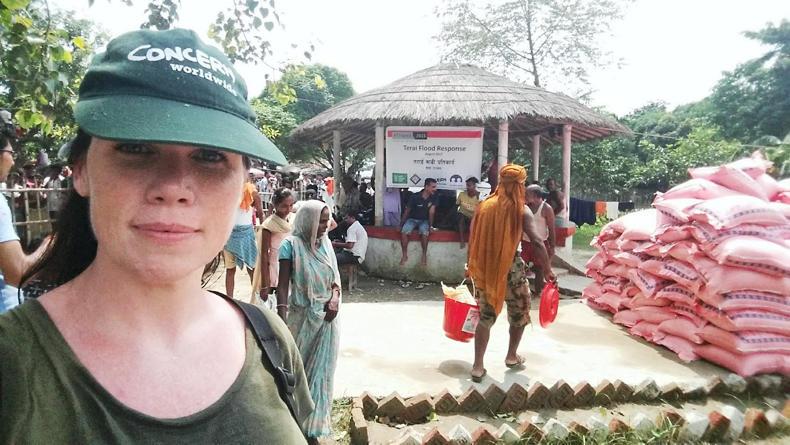
Eileen Morrow is the country director of Nepal, overseeing the humanitarian effort there.
People were huddled around fires, burning anything they had, and practically putting their bare feet and hands in the fire to keep warm. Thanks to my great team and local partners, we were able to provide blankets and tarpaulins to over 5,000 people over the next three days. This was all funded by Concern’s Irish supporters, this work wouldn’t be possible without their generosity.”
Eileen lives with her family in Nepal. This was not always the case. For the five years she was in Kenya, herself and her now husband had a long distance relationship. In a job that has international requirements, travel is something that had to be done. For those entering the sector, it may be a stickler, but not insurmountable.
“The phone bills used to be horrendous,” she jokes, “but now that the internet is so good and Skype is excellent, it’s much easier to stay in touch with loved ones abroad.”
Returning to Ireland seems to be a theme of Eileen’s life. From returning from the Netherlands at a young age and after her Masters, to the various returns during her career, this sort of travel is something that people must be able for in this job.
“We’ll definitely be back in Ireland in the future, it’s a fantastic place to live and it’ll always be home”.
“Two roads diverged in a wood, and I—I took the one less traveled by, And that has made all the difference.”
How to apply
If you are interested in a career in the aid sector, there are many avenues to joining. Having a professional skill is vital. Gaining work experience and experience overseas help set you apart from other candidates. Check out https://www.concern.net/jobs-and-volunteering-opportunities for opportunities with Concern in Ireland and overseas.
Two roads diverged in a yellow wood, And sorry I could not travel both, be one traveller, long I stood, And looked down one as far as I could, To where it bent in the undergrowth.”
In 1916, Robert Frost wrote the famous ‘Road Not Taken’. In it, he outlined the different paths one can take in one’s life. Whether Frost spoke of relationships or careers – is up for interpretation. However a career in humanitarian assistance is one path that few seem to tread.
One person who decided to choose this avenue was Eileen Morrow. The Dublin native works for Concern Worldwide, but since leaving college in the early 2000s she has worked for various NGOs in India, Haiti, Tanzania and Kenya.
Today, the 17 years of experience built up worldwide sees Eileen as country director of Nepal, a role that she says herself is as varied and rewarding as anyone could come across.

Eileen Morrow is the country director of Nepal, overseeing the humanitarian effort there.
“We spend 40 hours or more a week in work and I really believe in the value of finding what ignites your passion and pursuing it. What drew me to aid work was the urgent need to address poverty and injustice. What keeps me there is the huge learning opportunities and professional development, great colleagues and the chance to address complex problems and be part of something bigger,” she says.
In terms of career progression and variation, the humanitarian sector seems to tick the boxes thus far. But let’s backtrack for one minute.
Break
Eileen was born to Northern Irish parents in the Netherlands. Returning to Ireland at a young age, she grew up in Ballinteer in south Dublin before studying Psychology in UCD.
Travelling to India over college holidays in 2001, where she volunteered teaching English in a Tibetan Monastery, the then 20-year-old found the experience a real eye-opener.
“When I went to India for the summer I met so many people who lacked access to food, health care, education, water and clothes. I saw people doing back-breaking work, seven days a week and – even with that – couldn’t meet their basic needs.
“At the same time, people welcomed me into their homes, sharing what little they had with me, with such good humour and grace. It just didn’t seem fair that no matter what people tried, how hard they worked, they couldn’t escape the poverty trap. So I realised there was a big problem and I wanted to join the humanitarian effort.”
That she did. A Master’s degree in humanitarian assistance from the University of Groningen in the Netherlands led to an internship with the International Confederation of the Red Cross in Tanzania, working with refugees on the Congo border. She then went back to India. All the while, Eileen was developing the skillset and experience required for the sector.

Eileen Morrow is the country director of Nepal, overseeing the humanitarian effort there.
“While I was in India I completed intensive training on how to develop project plans that address people’s needs, create meaningful improvements in their lives, and get funding for them. I then facilitated workshops with local authorities and NGOs, helping them shape their ideas into funding applications for projects addressing local issues from drug addiction to education.”
When Eileen returned to Dublin again, it was World Vision Ireland that came calling. Initially based in Ireland as a programmes officer, she moved for Nairobi for five years as a programme co-ordinator, overseeing projects in East Africa.
Following a stint in Haiti in 2011, she returned to Ireland and joined Concern Worldwide working with them in their Dublin headquarters for the next five years, which paved the way for her new role as Concern Worldwide’s country director for Nepal today.
Why Nepal?
When speaking to Eileen, there is little doubt about the challenges she and her colleagues face daily. Poor infrastructure, inhospitable climates, political instability and various other factors face humanitarian workers worldwide. In Nepal, which is peaceful and even a popular tourist destination, the greatest obstacle is the unpredictability of natural disasters.
In April of 2015 an earthquake measuring 8.2 on the Richter Scale caused the deaths of 8,000 people, left hundreds of thousands homeless with an estimated $10bn of damage.
In an already impoverished nation, this devastated the country. Hundreds of aftershocks in the coming months made matters worse. It is now the job of Eileen and her colleagues to put structures in place to aid the rebuilding effort.
“It is a country under construction, but a huge amount has been achieved in the last three years due to both government and international efforts. My lasting memory of Nepal will always be of the resilience and quiet courage of the people here.
“I’ve heard so many stories from people across the country about how after the earthquake everyone helped each other, feeding their neighbours, giving them shelter as they rebuilt homes.”
The job itself
“Essentially, I am responsible for leading the Concern’s humanitarian programme in Nepal,” Eileen explains. “The heart of which is reconstructing 83 classrooms and putting in drinking water and toilet facilities in 44 schools. My job involves constantly liaising with my team and local partners to ensure the programme is delivering on its commitments, on time and to a high standard.”
From managing emails to speaking with government to brainstorming the logistics needed to get building materials to a remote school, Morrow deals with just about everything. One would rarely get bored you would assume.
Love for the job
“I love solving complex problems. Extreme poverty and ensuring a sustainable future are two of the biggest problems humanity faces and we need to solve them. We need more people working on them, people with solid skill sets and experience – engineers, computer programmers, lawyers, agriculturalists, accountants, HR specialists, administrators and supply chain managers. I’m not alone in wanting my children to grow up in a peaceful, healthy and just world. I believe that’s not possible if humanitarian crisis and inequality are left to exist, and it’s becoming increasingly urgent that we work together to find solutions to them.”
Emotionally
There is no doubt that this job may not be for everyone. Exposure to poverty, refugee camps and sickness can be tough mentally for some to take. “You do meet people and their stories are very upsetting, but these stories are still happening every day, whether we are hearing them or not. I am lucky that I am in a position to work with people to find ways to solve their problems.”
Parts of Nepal are still extremely poor. It was after the Christmas holiday, in January 2018 that one of the toughest moments encountered by Eileen occurred in rural Nepal. “There was a cold wave in the southern belt of Nepal over Christmas and extremely poor people who didn’t have adequate housing or clothes were beginning to die from the cold. I went down there with my team and was shocked to see children as young as mine with hardly any clothes and bare feet. There was a thick freezing fog, I was wrapped up in thermals and a big jacket and I was still cold.

Eileen Morrow is the country director of Nepal, overseeing the humanitarian effort there.
People were huddled around fires, burning anything they had, and practically putting their bare feet and hands in the fire to keep warm. Thanks to my great team and local partners, we were able to provide blankets and tarpaulins to over 5,000 people over the next three days. This was all funded by Concern’s Irish supporters, this work wouldn’t be possible without their generosity.”
Eileen lives with her family in Nepal. This was not always the case. For the five years she was in Kenya, herself and her now husband had a long distance relationship. In a job that has international requirements, travel is something that had to be done. For those entering the sector, it may be a stickler, but not insurmountable.
“The phone bills used to be horrendous,” she jokes, “but now that the internet is so good and Skype is excellent, it’s much easier to stay in touch with loved ones abroad.”
Returning to Ireland seems to be a theme of Eileen’s life. From returning from the Netherlands at a young age and after her Masters, to the various returns during her career, this sort of travel is something that people must be able for in this job.
“We’ll definitely be back in Ireland in the future, it’s a fantastic place to live and it’ll always be home”.
“Two roads diverged in a wood, and I—I took the one less traveled by, And that has made all the difference.”
How to apply
If you are interested in a career in the aid sector, there are many avenues to joining. Having a professional skill is vital. Gaining work experience and experience overseas help set you apart from other candidates. Check out https://www.concern.net/jobs-and-volunteering-opportunities for opportunities with Concern in Ireland and overseas.






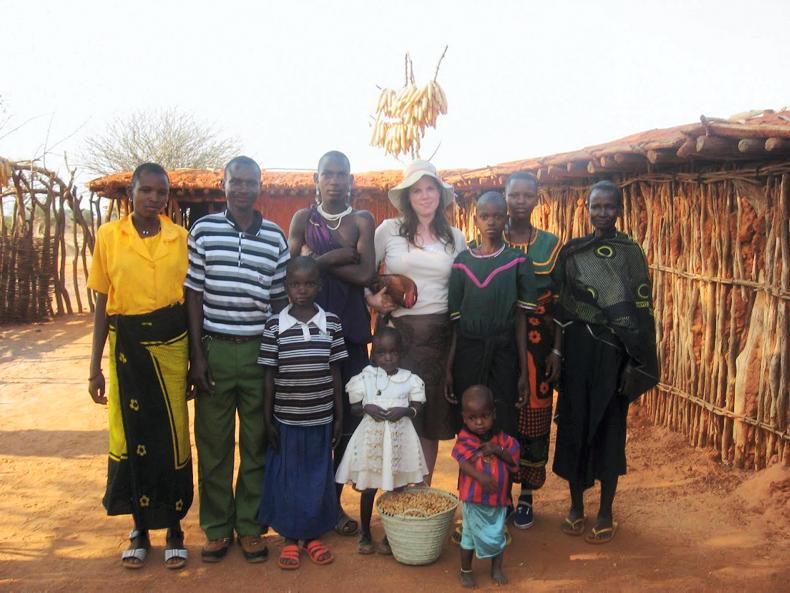

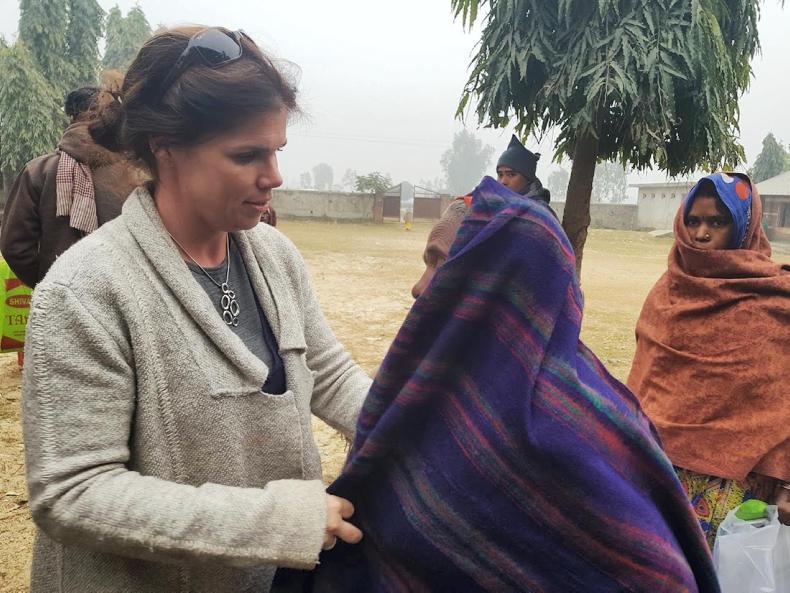



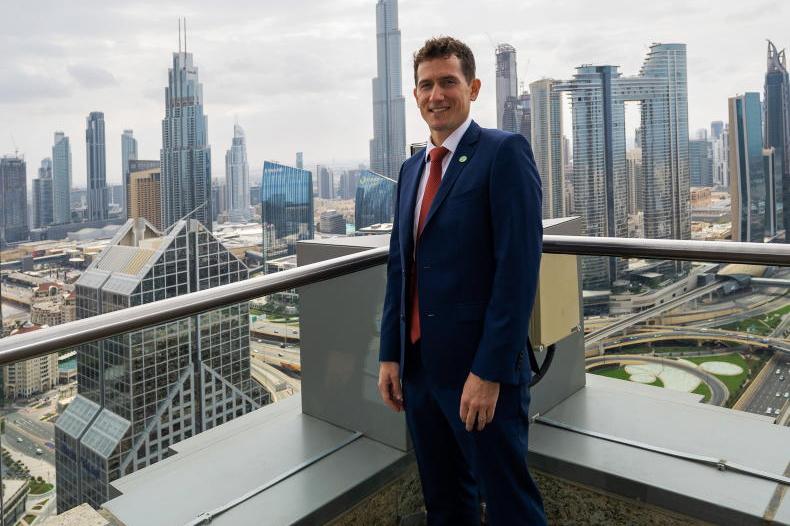


SHARING OPTIONS